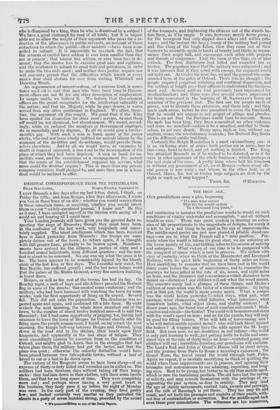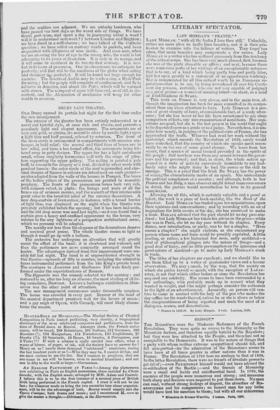THE IRON AGE.
OUR grandfathers sang a glee, beginning • " If a man were secure That his life would endure To a thousand long years," and continuing to imagine the prodigious works he would on such conditions of vitality undertake and accomplish, "and all without trouble or care." There was great wisdom in desiring an exten- sion of life proportionate to the magnitude of designs, for surely it is felt to be a sad thing to be aged in the age of improvements. The middle-aged gentry are just now placed at pitiable disadvan- tage—we are in what the French call a" false position." Pre- cisely when the world is taking its great start, we are entering on the worse moiety of life, and bidding adieu to the season of activity and enterprise. What victory of our time is to be compared with the conquest of space which is now in process. We sicken with envy of posterity, when we think of the Manchester and Liverpool Railway, with its quiet little beginning of thirty miles an hour. How mortifying to consider that we have been cast in the world thirty years before the age of convenience, and to remember the journeys we have jolted at the rate of six, seven, and eight miles an hour, and the pleasures and conveniences which distances have denied us—distances ! our children will ask what the word means. The ancients- surely had- a glimpse of these things, and Medea's caldron of renovation was the boiler of a steam-engine. By being put in that pot, the world is made young again. What a codger was the world before yesterday !—what ways, what gait, what carriage, what clumsiness, what fallacies, what ignorance, what humdrum habits, what abject ideas, and shabby content ! A dozen years ago, the boast was of mail-coaches and canals ! Mail- coaches and canals—the Goths ! The world will henceforward skate with the wind's speed on iron ; and as for the canals, they will only be good for filling boilers. Who will talk of horse-racing now? who will match mettle against metal ? who will back blood against the boilers ? A waggon may have the odds against the St. Leger field. But even now, we are doubtless in our infancy—the world is only just learning to walk, just putting forth its feeble and unas- sured legs at the rate of thirty miles an hour—wretched going, our children will say ; incredible drawling, our grandsons will exclaim. The Land's End and John o' Groat's House will be short drives, and the journey from Paris to Rome a morning's excursion ; the Grand Tour, the travel round the world through both Poles. Again we repeat, it is mortally mortifying to think of quitting the world when these improvements are in process, and opening their triumphs and conveniences to our admiring, expecting, and long- ing eyes. Best to be young, but better to be old than middle-aged, which is now the tantalizing position. The old have lost the spring of activity, and may console themselves with the privilege of ex- aggerating the past system, so dear to senility. They may laud the age of stately movements, cocked hats, swords and periwigs, and the talk of Ranelagh is yet theirs. They-too may fib and crack, and set forth the passages and exploits of their youth, with- out fear of contradiction or correction. But the middle-aged lack even these poor consolations. The witnesses are too numerous, and the realities too adjacent. We are unlucky borderers, who have passed our best days on the worst side of things. We have drunk port-wine, and spent a day in journeying (what a word ! Wilt it be understood next week ? ) between London and Brighton ; we have dined in a coffeehouse ; we have talked of the Catholic question ; we have sailed on contrary winds in packets, and been acquainted with diligences of nine inside. And even now, when we are crossing the line of age to thE: wrong side, the world is but advancing to its years of discretion. It is only- in its nonage, and it will come to manhood in its twenty-first century. It is now but in its teens of greenness. One inconvenience we anticipate for posterity, and that will be the smallness of the globe when railing and steaming Gbe perfected. It will be found not large enough for exercise. The deserts of Arabia may be in ade a ring, a Hyde Park for airing ; but the people will complain of confinement, and fly to suburbs in America, and about the Poles, which will be warmed with stoves. The conquest of space will thus end, as of old, in dis- content, and the Alexanders of mechanics will weep for other worlds to overrun.



























 Previous page
Previous page